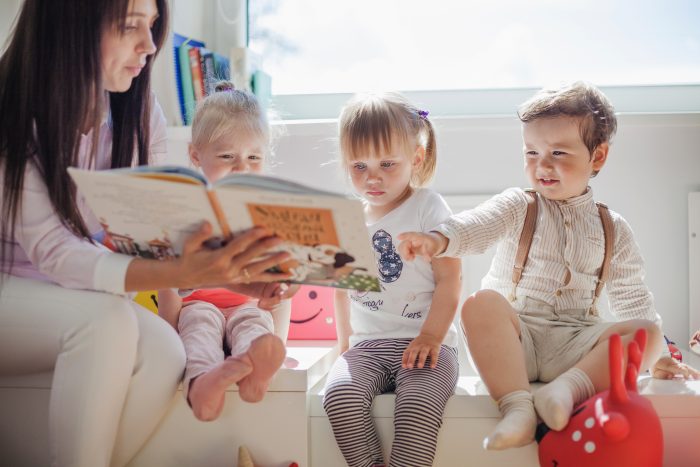Early Childhood Professional Development Workshops

The Early Childhood Professional Development Workshops are specially designed to help pre-school educators realise and stretch every young learner’s potential as they grow and develop in this critical age.
Child Development Theories
In this course, educators/caregivers will be exposed to a diverse range of child development theories that are vital in supporting the growth and development of each child.
In light of the theoretical underpinnings, educators/caregivers will understand the significance of providing a child with holistic development, and be equipped to calibrate teaching methods through various levels (0 to 8 years of age).
Educators/caregivers will also be introduced to various developmental milestones across age groups including:
- Birth and infancy
- Toddlerhood
- Preschool
- Early School-goers
These outline the developmental stages of children and identify the typical ages at which these growth milestones occur; culminating to the notion of children being able to progressively learn and increase their skills and scope of understanding.
Thereafter, the framework of Motor Skills Development, Cognitive Development, Language Development, and Social-Emotional Development will be discussed. By revolving around this framework, we aim to facilitate holistic learning amongst children.
Motor Skills Development
Motor skills development – or the use of the hands, lays the foundation for academic learning during the later years. It refers to progressive and sequential changes that are age-related and unfolded in unique ways. In this course, educators/caregivers will understand the three stands of learning in motor skills development:
- Motor skills acquisition;
- Health and fitness;
- Safety awareness
Mastering both fine and gross motor skills are important for children’s growth and independence. Having good motor control helps children explore the world around them and also helps with their cognitive development. Other than being aware of the particular skills, educators/caregivers also need to provide ample opportunities for students to practice. This plays a significant role in shaping their physical fitness, agility and body coordination.
Educators/caregivers will also apply their understanding of theories to organise the learning environment. This will be achieved through the development of motor skills as a journey, not a scripted checklist with skills being crossed off in a systematic manner. Every child’s path to enhanced gross and fine motor abilities varies. What is important is that children continue to evolve their motor skills.
Cognitive Development
Cognitive development involves helping children understand and apply the concepts and skills of literacy and numeracy. It is the construction of thought processes, including remembering, problem-solving, and decision-making. Educators/caregivers will unravel and apply concepts that focus on the role of environmental factors in shaping theintelligence of children, especially on a child’s ability to learn by having certain behaviours rewarded and others discouraged.
Educators/caregivers will also apply their understanding of theories to organise the learning environment. This will be achieved through the clear understanding of children’s growth, by constantly investigating and experimenting as they build their comprehension of how the world works.
Language Development
Language and literacy development are essential in equipping children with the ability to express themselves, and to communicate effectively with others. Children develop language at a very rapid pace. However, the age and the pace at which a child reaches each milestone of language development varies greatly. Learning to understand, use and enjoy language is the critical first step in literacy, and the basis for learning to read and write.
In this course, educators/caregivers will focus on the integration of language and literacy during the early years. Language development is a higher level cognitive skill involving audition and oral abilities in humans to communicate individual wants and needs. This course will also enable educators/caregivers to utilise the strategies for language and literacy.
Educators/caregivers will also apply their understanding of theories to organise the learning environment. Theories that attribute the development of language to an individual’s social interactions and growth will be thoroughly explored.
Social-Emotional Development
Social-emotional development includes the child’s experience, expression, management of emotions, and the ability to establish positive and rewarding relationships with others. It focuses on personal well-being and social well-being, while paying attention to responsible decision-making to develop a positive sense of themselves in relation to friends, family, and the community.
The aim is to build a child’s character. Therefore, this course also outlines the strategies surrounding social and emotional development. Educators/caregivers will also apply their understanding of theories to organise the learning environment. Exercises surrounding how children start to understand who they are, what they are feeling and what to expect when interacting with others, will be put in the spotlight as the course progresses.
Classroom Management Theories
Effective classroom management methods assist educators in the approach of positive teacher-student interactions.
This course aims to empower educators/caregivers to reflect critically on the theories and examine how these theories are relevant in the early childhood environment. More specifically, this course enables educators/caregivers to observe and interpret children’s behaviour, as well as build positive relationships with children through communication and interaction in the classroom.
Classroom Management Strategies
Classroom management strategies are essential to not only build positive teacher-student interactions, but also to observe and document children’s learning patterns. In this course, educators/caregivers will examine the various classroom management strategies, types of observations and documentations, and utilisation of various lens to understand each child.
Principles and Practices in Early Childhood
This course provides educators/caregivers an overview of Early Childhood Care and Education (ECCE), pedagogical principles, and the approaches of ECCE across time and context.
At the end of this course, educators/caregivers need to understand that ECCE goes beyond preparing children for school; neither is it merely about preparing children for his/her life ahead. Rather, development is about the day-to-day experiences of children. Educators/ Caregivers can make a difference in each child’s experiences, one day at a time, and as days lead to months and months to years.
Please email contact@cpdsingapore.com for more information on our workshop.
